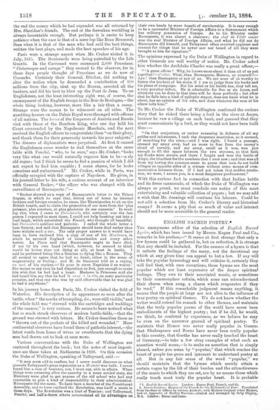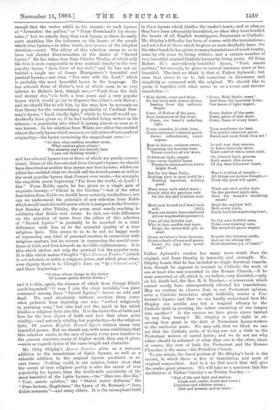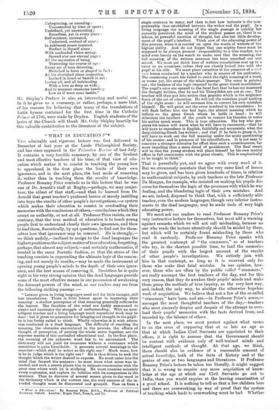ENGLISH SACRED POETRY.*
THE anonymous editor of the selection of English Sacred Lyrics, which has been issued by Messrs. Kegan Paul and Co., remarks in his preface,—" It seems at first strange that only a few hymns could be gathered in, but on reflection, it is strange that any should be included. For the essence of a hymn is that it reflects the feelings of the many, not the devotional cry which at any given time can appeal to but a few. If any will take the popular hymnology and will criticise it, certainly they will find that, with rare exceptions, those hymns are the most popular which are least expressive of the deeper spiritual feelings. They owe to their associated music, or sometimes to their commonplace refrain, which none can misunderstand their charm when sung, a charm which evaporates if they be read." If this remarkable judgment means anything, it means that the people at large are not alive to the influence of true poetry on spiritual themes. We do not know whether the writer would extend his remark to other themes, and maintain that the truly popular poems of the world have never been embodiments of the highest poetry ; but if he did, he would, we think, be confuted by experience, HS we believe he may be even on the narrower ground of spiritual poetry. To maintain that Homer was never really popular in Greece, that Shakespeare and Burns have never been really popular in this country, that Goethe has never really touched the heart of Germany.—to take a few stray examples of what such an assertion would mean,—is to make an assertion that is simply absurd, unless you mean by "popular," that which reaches the heart of people too gross and ignorant to understand poetry at all. But in any fair sense of the word "popular," we should maintain that the hymns which merely attain a certain vogue by the lilt of their burden and the attractiveness of the music to which they are set, are by no means those which really touch most truly the popular heart. It is probable
• 1. English Sacred Lyrics. London : Kean Paul, Trench, and Co.
2. Annus Sanctus; Hymns of the Church for the Ecclesiastical Year. Translated from thaffiacred Offices by various Authors, with Modern Original other Hymns, and an Appendix of Earlier Version., selected and arranged by Orby Shipley,
M.A. London: Bums and Oates.
enough that the writer refs in his remarks to such hymns as "Jerusalem the golden," or "From Greenland's icy moun- tains ;" but we utterly deny that such hymns as these do really exert anything like the influence on the hearts of the people which true hymns,—in other words, true poems of the simplest devotion,—exert. The editor of this selection seems to us to have but slender discrimination in the choice of "Sacred Lyrics." He has taken four from Charles 'Wesley, of which only the first is even comparable in true poetical beauty to the very popular hymn, " Jesu, lover of my soul ;" and he has not ex- tracted a single one of James Montgomery's beautiful and poetical hymns,—not even "For ever with the Lord," which is probably the most beautiful hymn in the language. He has selected three of Heber's, two of which seem to us very inferior to Heber's best, though one,—" Forth from the dark and stormy sky,"—is both a true poem and a very popular hymn which would go far to disprove the editor's own theory ; and we should like to ask him, by the way, how he accounts on that theory for the extraordinary popularity of Cardinal New.
man's hymn, "Lead, kindly light," which he himself would un- doubtedly have given us, if he had included living writers in his scheme,—a popularity into which it sprang almost as soon as it was known. In his selection from Watts our editor has omitted almost the only hymn which seems to us indicative of true poetical originality,—the hymn containing the magnificent verse :—
"In thee what endless wonders meet, What various glory shines!
The crossing rays too fiercely beat Upon our fainting minds ;"
and has selected hymns two or three of which are purely conven- tional. Three of the five selected from Cowper's hymns we should have described as neither true poems nor true hymns ; whilst our editor has omitted what we should call the truest poems as well as the most popular hymns that Cowper ever wrote,—for example, the exquisite poem beginning "Far from the world, oh Lord ! I flee." From Keble, again, he has given us a single gem of exquisite beauty,—" Christ in the Garden,"—but of the other four taken from Keble we should have certainly omitted two ; nor can we understand the principle of any selection from Keble which would omit the noble poem which is assigned to the Twenty- first Sunday after Trinity, the poem most nearly reaching to sublimity that Keble ever wrote. In fact, our wide difference on the question of taste from the editor of this selection of "Sacred Lyrics" is probably to be ascribed to a total difference with him as to the essential quality of a true religions lyric. This seems to us to be not its happy mode of expressing any kind of personal emotion in connection with religious matters, but its success in expressing the special emo- tions of faith and love towards an invisible righteousness. It is this which strikes not only the poetical but the popular note.
It is this which makes Clough's "Qud Cursum Vantus" (which is not selected) so noble a religious poem, and which gives what- ever dignity there is to Clough's lines on " Qui laborat orat," and those beginning,—
" 0 thou whose image in the shrine Of human spirits dwells divine ;"
and it is this, again, the absence of which from George Eliot's much-bepraised "0 may I join the choir invisible,"—a piece contained among these "Sacred Lyrics,"—leaves us cold and dead. We read absolutely without emotion those some- what pedantic lines depicting one who "sobbed religiously in yearning song," but who had not the spark in her which kindles a religious lyric into life. It is the elastic fire of faith and love for the true object of faith and love that alone gives vitality,—and not only vitality, but popularity,—to the religious lyric. Of course, English Sacred Lyrics contain many very beautiful poems. But we should say, with some confidence, that this selection omits, in the case of nearly every poet familiar to the present reviewer, many of higher worth than any it gives, —even as regards lyrics of the same length and character.
Mr. Orby Shipley's Annus Sanctus gives us a welcome addition to the translations of Latin hymns, as well as a valuable addition to the original hymns produced in re- cent times. Nothing could, in our opinion, better show that the secret of true religious poetry is also the secret of true popularity for hymns, than the world-wide popularity of the most beautiful of the Latin hymns,—the "Dies irEe, dies illa," "Veal, sancte spiritus," the " Stabat mater dolorosa," the "Pone luctum, Magdalena," the hymn of St. Bernard—" Jean, dulcis memoria "—and many others. It is the triumphant faith in these hymns which kindles the reader's heart; and so often as they have been adequately translated, so often they have kindled the hearts of all English worshippers, Protestant or Catholic. Mr. Shipley's difficulty has been, of course, with the translations ; and not a few of those which he gives us seem decidedly lame. On the other hand, he has given us many translations of much beauty, some by old, some by living writers ; and a certain number of very beautiful original Catholic hymns by living poets. Of King Robert H.'s marvellously-beantiful hymn, " Veni, sande spiritns," for example, he gives us several versions, more or less beautiful. The best we think is that of Father Aylward ; but even that seems to us to fail somewhat in directness and simplicity as compared with the original. We should like to quote it together with what seems to us a terser and stricter translation :—
" Holy Spirit, come and shine On our souls with beams divine, Issuing from thy radiance bright.
Come, 0 Father of the poor, Ever bounteous of thy store, Come, our heart's unfailing light.
Come, consoler, kindest, best, Come, oar bosom's dearest guest, Sweet refreshment, sweet repose.
Rest in labour, coolness sweet, Tempering the burning heat, Truest comfort of our woes.
0 divinest light, impart Unto every faithful heart Plenteous streams from love's bright flood.
But for thy blest Deity, Nothing pure in man could be ; Nothing harmless, nothing good.
Wash away each sinful stain ; Gently shed thy gracious rain On the dry and fruitless soul.
Heal each wound and bend each will, [chill, Warm our hearts benumbed and All our wayward steps control.
Unto all thy faithful just, Who in thee confide and trust, Deign the seven-fold gift to send.
Grant us virtue's blest increase, Grant a death of hope and peace, Grant the joys that never end."
Father Aylward's version has many more words than the original, and loses thereby in intensity and strength. Mr. Shipley boasts that he has included no single heretical transla- tion, though he appears to account as Catholic the work of one at least who was converted to the Roman Church,—if he were converted at all, which is, we believe, very doubtful,—only on his death-bed, the Rev. R. S. Hawker,—a conversion which cannot surely have retrospectively affected his translations.
May we venture to observe that, in our Protestant opinion, even a Catholic translator might faithfully render a Pro- testant's hymn; and that we can hardly understand how Mr.
Shipley can ascribe any but a magical efficacy to the Catholic faith in securing the better rendering of one tongue into another ? Is the version we have given above tainted by any deep heresy ? Mr. Shipley is quite right in ob- serving how great is the debt of Protestant hymn-writers to the mecliwval poets. We may add, that we think we can see that the Catholic poets of to-day owe not a little to the Protestant writers of sacred lyrics ; and we do not see why either should be ashamed of what they owe to the other, since, of course, the root of both the Protestant and the Roman Churches is the same,—the Primitive Church.
To our minds, the finest portion of Mr. Shipley's book is the second, in which there is less of translation, and more of original composition. And in it we find much that will give the reader great pleasure. We will take as a specimen this fine meditation of Father Oakeley's on Trinity Sunday :—
"God of life and light and motion, Cause and centre, fount and home ; Limitless and tideless ocean ; Past and present and to come :
"Come, Holy Spirit, come ! And from thy heavenly home, One beam of light impart.
Come, father of the poor, Come, giver of rich store, Come, flame of every heart.
Thou comforter the best, The spirit's sweetest guest, Sweet and most fresh thou art !
In toil, rest that renews, In fever, heavenly dews, Kind comfort when tears start.
Oh, blessed light, possess Each secret, dim recess Of thy dear followers' heart.
Man is a thing of naught—
All things are poison-fraught,— From thy good will apart.
Wash out each guilty stain On the parched spirit rain, Heal the wound's throbbing smart !
Bend the nopliant will, Melt every icicle, Guide back the wandering heart.
To thy own faithful ones, Thine ever-trusting sons, The sevenfold grace impart.
Requite the virtuous strife, And OD the ebbing life
Shed deathless joy of heart." 17nbeginning, as unending ; Uncontrolled by time or space ; Undefined, yet unextending ; Boundless, yet in every place : Self-existent, uncreated, Underived, evolved of none ; In sublimest peace instated, Perfect in thyself alone : With unclouded vision seeing, Spread o'er one eternal page ; All the mysteries of being Traversing the course of age : Every art of man detecting, Sketched in form or shaped in fact ; All his cherished plans inspecting, Locked in heart or barred in act : Loving all, and all befriending With a love as deep as wide ; And to meanest creatures bending Low as if were none beside."
Mr. Shipley's Preface is also an interesting and useful one. In it he gives us a summary, or rather, perhaps, a mere hint, of his reasons for believing that many of the translations of Latin hymns contained for the first time in the Catholic Primer of 1706, were made by Dryden. English students of the lyrics of the Church will thank Mr. Orby Shipley heartily for
this valuable contribution to the literature of the subject.




































 Previous page
Previous page